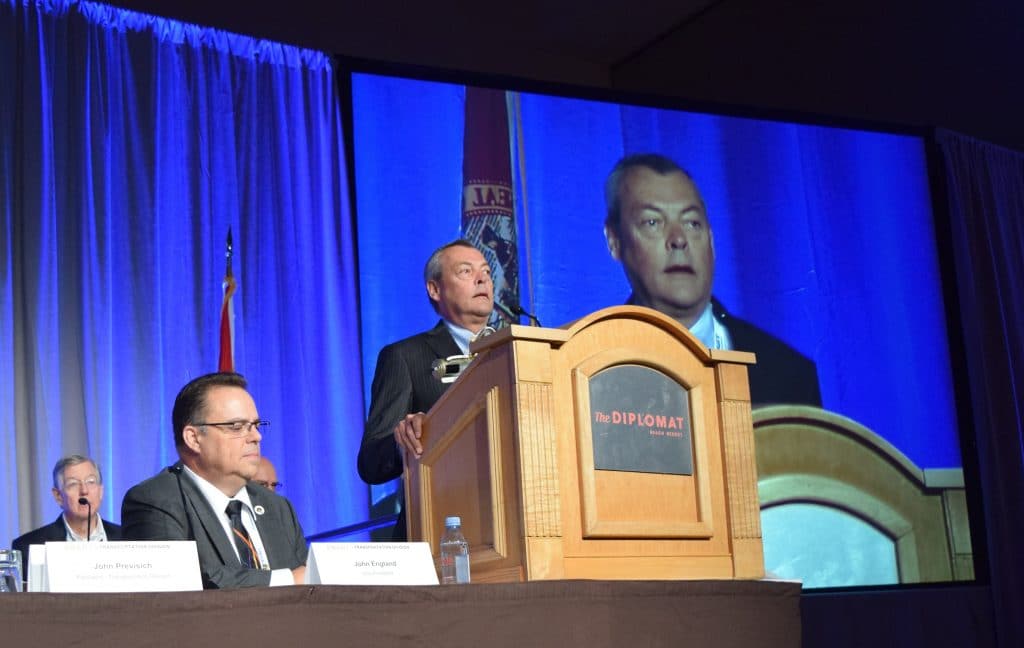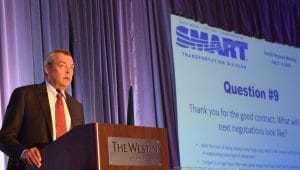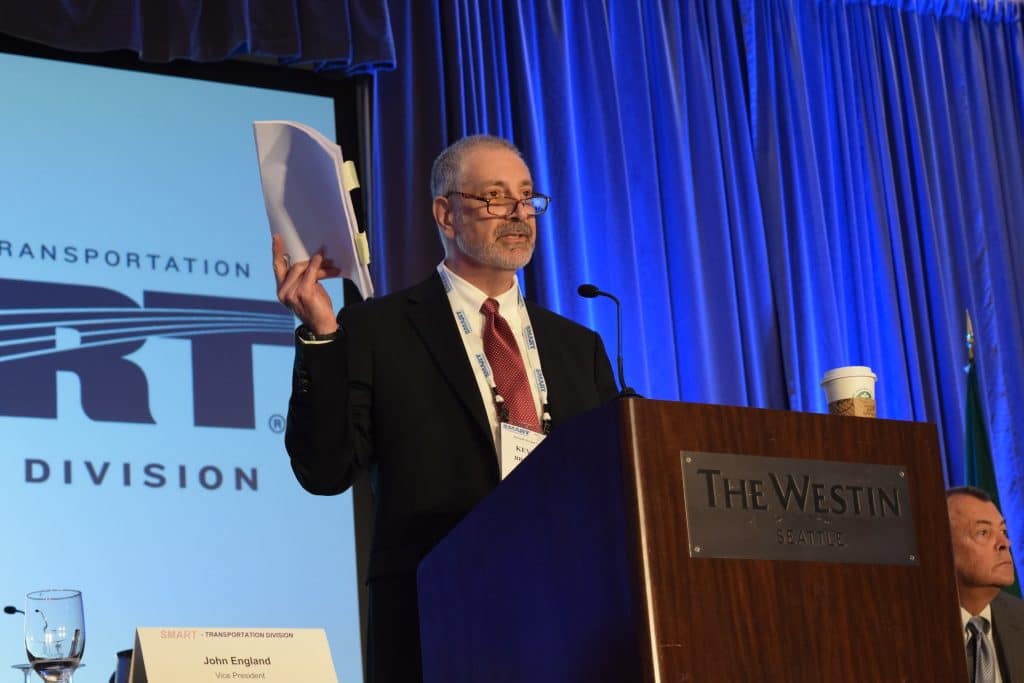HOLLYWOOD, Fla. — Transportation Division President John Previsich looked to the recent past to point the way to the future on Monday, Aug. 6, at a critical point in United States labor history.
In opening remarks to the International Association of Sheet Metal, Air, Rail and Transportation Workers’ first combined educational meeting at the Hilton Diplomat Resort in Hollywood, Florida, Previsich reflected on the status of the coordinated bargaining unit’s national rail agreement talks that appeared to be at a standstill last summer and an appearance at the Sheet Metal Business Agents Conference in Vancouver last year that he said might have changed the tide.
At the time, a declaration of an impasse was likely at the next meeting between the rail labor unions and the carriers and a Presidential Emergency Board would convene, Previsich said.
But the potential impasse was broken at the next meeting with the carriers willing to negotiate, and Previsich has an inkling of what played a big part: unity.
“I told the Sheet Metal brothers and sisters in the room that when the time came, and that we had to look at a Presidential Emergency Board, I said I didn’t want 65,000 Transportation Division members calling the White House, I wanted 200,000 SMART members calling the White House,” Previsich said. “Every brother and sister stood up and pledged their support. I would like to think that support, that word, that message, got – maybe to the White House. It got somewhere good, because at the very next session immediately after that meeting in Vancouver, the railroads came into the room and started negotiating.”
Within a month, a contract offer was on the table that was ratified Dec. 1, 2017, by four out of five TD members, Previsich said.
“It was the support of everyone in that room that made that happen,” he said.
Establishing that unity not only within SMART but among all labor organizations nationwide and education efforts will be key in the aftermath of the attack on labor in the form of this summer’s Janus decision by the U.S. Supreme Court, Previsich said.
“There are forces out there that want to reset the entire playing field. They want to move the goalposts to a place that we can’t get to. They started with Janus,” he said.
The Janus decision nullifies the ability of public-sector unions to collect what are known as maintenance fees from “free-riders” — those people who take advantage of union membership benefits but do not pay for those benefits.
“It’s not going to be fatal to our organization, but it will be close to fatal to other organizations,” Previsich said.
Teachers unions, the SEIU and unions that protect government employees will be most affected, but that doesn’t mean that those anti-union forces will stop at just that single victory to crush labor in the U.S., he said.
“The next step is to private employers and there are already efforts to start that happening,” Previsich said. “They create a dispute here, a dispute there, get some conflicting court decisions and boom, it bubbles up to the Supreme Court.”
With a second Supreme Court vacancy to be filled by the Trump administration, 150 years of labor history that workers fought and died for is under attack and in jeopardy in the United States, Previsich said.
Union members need to act.
“We can no longer sit back and let somebody else take care of our business. We have to take care of it,” Previsich said. “We have to stand united, not only within, but with every other labor organization in the country. We need to talk to our friends, our relatives, our neighbors and everybody we encounter in the grocery store and let them know the labor movement is an honorable movement.
“It’s the foundation of America, and if they start beating back the unions, they’re going to beat back every employee in any form whether they’re unionized or not … we can’t let it happen.”
The key to stopping the attack will be individual action and spreading the word, member-to-member, about the importance of the November mid-term elections, Previsich said.
“This is really the cliff-side point in labor history. I can’t stress strongly enough how important it is that we get out there and motivate our members to get out there to preserve the labor movement,” he said. “We can’t forget our paychecks. We can’t forget our pensions, our benefits and our families.
“We need to make sure our members are educated on everything that is important to the cause, the movement, the preservation of the labor lifestyle that comes about as the result of unions and the hard work that they’ve been doing for 150 years.”
Earlier in the opening session, SMART General President Joseph Sellers Jr. and General Secretary-Treasurer Rich McClees also encouraged the further development of solidarity by increasing cooperation between the Sheet Metal and Transportation Division membership.
The Hollywood, Fla., combined educational meeting itself marks the first time since the Sheet Metal and Transportation Division’s merger that both a TD regional meeting and a Sheet Metal business agents conference have taken place at the same location.
Tag: Janus case
SEATTLE — SMART Transportation Division President John Previsich answered questions from members about the Janus decision, upcoming 2019 national rail labor contract negotiations and discussed new technological initiatives.
The Janus decision affects a handful of properties that have SMART TD representation, but leaves rail properties relatively unscathed for the time being, Previsich said.
“Our rail people, for the most part, don’t worry about it — yet,” he said. “The direct result of this decision will not directly affect anyone who works for BNSF, UP, CSX, NS, most of your short lines…”
Potentially one rail property and some bus properties could be affected by Janus, he said.
“Where we do have to worry is our operations that are operated by the public agency not under the Railway Labor Act — typically it’ll be a municipal bus company,” Previsich said. “We’ve had meetings with each and every property. They’ve already been contacted, they know what to do and we’ll go ahead and work our way through. ”
It’s those future attacks from anti-labor interests and court cases that we’ll have to be aware of in this era where all branches of government are stacked against labor, he said.
“They’re not done yet — we’re going to see more of it,” Previsich said. “Not only are both houses of Congress lined up against us, the White House is lined up against us and the Supreme Court is lined up against us.”
To fight back, union brothers and sisters, their friends, neighbors, families and others will need to vote and get the word out on issues important to the union, such as safety.
“Elections matter,” Previsich said.
Also regarding politics, a member asked about how the viewpoints of members who are more conservative would be addressed.
“We welcome a free and honest dialogue and discussion about a number of issues,” Previsich said. “But the one thing that we need to do, that we’re going to do and what we are going to continue to do is to educate our members about our issues.”
Some members may have strong feelings on conservative issues, but those issues need to be balanced with the impact it will have on their livelihood and their families, he said.
“Not everybody is going to vote the way I would like them to vote, I understand that,” Previsich said. “But what I do want, and I think what we all want, is for those votes to be educated votes. We want the people casting the ballots to know what the issues are.”
Also ahead, is the start of negotiations for a new national rail contract, which is up in 2019, with a number of details to be determined.
Previsich said that the joint negotiating tactics by unions that were successful in the last contract will be repeated at least at the outset of the new talks as the carriers offer up their resistance.
“Going into those negotiations, there are some things you can count on,” he said. “Number 1, they won’t want to give us any more money; Number 2, they’re going to want to attack our healthcare … they’re going to go after our workers. That’s standard, that happens every time.”
The labor side is well aware of the breaks the carriers got with the Republican tax plan that was passed in late 2018, and that will definitely be in play during contract talks, Previsich said.
“Our job this time is to get a better deal than we got last time. That’s what we’re looking for — that’s what we’re always looking for,” he said. “They can’t hide behind finances. Not only do they have record revenues and record profits, it’s record tax cuts, record givebacks, record stock buybacks…the economics are going to work in our favor this time around.”
A Section 6 filing to signal the start of negotiation will be filed in the future, he said.
SMART TD also is improving its technological base, Previsich said.
“One of the things we are trying to do is leverage the technology in a way that is going to improve communications that we have,” Previsich said.
Questions were submitted by members using the upgraded and improved SMART TD app. It can be downloaded from the Apple App Store or through Google or by visiting smart-union.org/td/mobile.
Also ahead are upgrades from the decades-old legacy system to help improve how local secretaries and treasurers do their jobs with a rollout planned to begin in October with full implementation in January 2019.
Strength, unity and education will be the way to fight the United States Supreme Court’s 5-4 decision last week on Janus v. AFSCME 31 that overturned more than four decades of legal precedent.
That was the message given at the opening session of the SMART Transportation Division Regional Meeting on July 1 in Seattle.
The 49-page decision written by Justice Samuel Alito and supported by the four other conservative justices eliminates the ability of public sector unions to collect agency fees from those employees who refuse to be union members, yet still receive the benefits negotiated by unions.
“Janus is something that is indicative of an anti-labor movement in certain parts of the government that they’re working very hard to take away the rights and privileges that we have worked for for a number of years,” SMART Transportation Division President John Previsich said.
SMART TD General Counsel Kevin Brodar explained to attendees the magnitude of the decision and how the conservative tilt of the court, achieved with the installation of President Donald Trump’s nominee Neil Gorsuch, poses an ongoing menace to labor.
“It is everything we thought it would be,” Brodar describe the Janus decision, written by Alito. “From every page drips his contempt for labor and unions. This is less a legal opinion as it is a right-wing manifesto against labor. That’s the sad story.
“Justice Alito and his Federalist Society conspirators are once again trying to sell the public on a two-century-old idea that organized labor is nothing more than legalized extortion. Having lost the battle of ideas over the years because unions are still here, they have taken the idea that they can strangle unions out of existence by ending their funding.”
Janus overturns the 9-0 decision in Abood v. Detroit Board of Education made in the 1970s in which, Brodar said, “some of the heaviest hitters in the legal field” all agreed that unions had the power to collect agency fees from “free-riders,” non-paying members who still received benefits negotiated by the unions.
“This is essentially a green light to anyone who wants to stop paying unions dues in the public sector,” Brodar said. “The idea is to drain union coffers of their money, drain them of their political clout, drain them of the ability to represent their members. With that, disappears a decent wage, pension plans, health care — all gone. That’s the plan of this case.”
The Janus decision is another attack on the United States labor movement, Brodar said — the newest moment in a long line of resistance against people uniting for a common cause to improve their lives.
“This case is an attack on working people. It’s an attack not just on public sector unions, but all of us in this room. This is an attack on every member of this union,” Brodar said. “No matter how many bayonets and bullets they used, they couldn’t kill the idea. They couldn’t kill the cause. It exists today. Why is that? Because this is a righteous and just cause. And you, all of you here, are the heirs to that cause.”
The fight will continue, Brodar said, and he urged members to come together, educate themselves and be prepared to battle future efforts to weaken the power of labor and tip the scales in the favor of the carriers.
“This is not the last shot. There will be many more shots coming. It’s up to us to respond,” Brodar said.
“If this union disappears, there are dark days ahead. There are dark days right now — there will be another Supreme Court appointment who won’t be a labor-friendly guy.
“What we need is solidarity. It’s solidarity that brought us here,” Brodar said. “There’s work to be done, and it’s time.”


